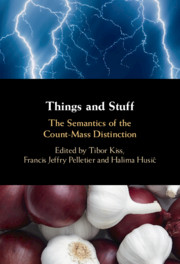Book contents
- Things and Stuff
- Things and Stuff
- Copyright page
- Dedication
- Contents
- Figures
- Tables
- Contributors and their Affiliations
- Preface
- 1 Editorial Introduction: Background to the Count–Mass Distinction
- Large-Scale Architectures for Count and Mass
- Implications from Individual Languages
- Compositional Analyses and Theoretical Issues
- 10 Ontology, Number Agreement, and the Count–Mass Distinction
- 11 The Semantics of Distributed Number
- 12 Container, Portion, and Measure Interpretations of Pseudo-Partitive Constructions
- 13 Overlap and Countability in Exoskeletal Syntax: A Best-of-Both-Worlds Approach to the Count–Mass Distinction
- New Empirical Approaches to the Semantics of the Count–Mass Distinction
- References
- Language Index
- Subject Index
11 - The Semantics of Distributed Number
from Compositional Analyses and Theoretical Issues
Published online by Cambridge University Press: 21 May 2021
- Things and Stuff
- Things and Stuff
- Copyright page
- Dedication
- Contents
- Figures
- Tables
- Contributors and their Affiliations
- Preface
- 1 Editorial Introduction: Background to the Count–Mass Distinction
- Large-Scale Architectures for Count and Mass
- Implications from Individual Languages
- Compositional Analyses and Theoretical Issues
- 10 Ontology, Number Agreement, and the Count–Mass Distinction
- 11 The Semantics of Distributed Number
- 12 Container, Portion, and Measure Interpretations of Pseudo-Partitive Constructions
- 13 Overlap and Countability in Exoskeletal Syntax: A Best-of-Both-Worlds Approach to the Count–Mass Distinction
- New Empirical Approaches to the Semantics of the Count–Mass Distinction
- References
- Language Index
- Subject Index
Summary
We propose that pluralization of bare nouns in Western Armenian and Turkish is a two-step process. First, the noun is atomized giving a singular form (this is achieved via a null exponent of number under Num) and a new noun is created providing a brand new semi-lattice to serve as the underlying semantic domain. Second, the higher NumP operates morphosyntactically on the singular, and returns a set of atoms from the semi-lattice introduced by the higher n. This is a case of morphological compositionality where one number is built out of another. Our proposal gives a satisfying solution to the puzzle of how “indeterminate nouns” in these languages can express singularity and plurality, depending on the context.
- Type
- Chapter
- Information
- Things and StuffThe Semantics of the Count-Mass Distinction, pp. 261 - 278Publisher: Cambridge University PressPrint publication year: 2021

